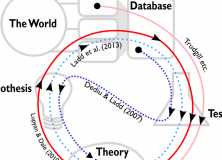
James and I have written about Galton’s problem in large datasets. Because two modern languages can have a common ancestor, the traits that they exhibit aren’t independent observations. This can lead to spurious correlations: patterns in the data that are statistical artefacts rather than indications of causal links between traits. However, I’ve often felt like … Continue reading “How spurious correlations arise from inheritance and borrowing (with pictures)”

Mark Dingemanse and I will be appearing the Discovery Festival in Amsterdam on Friday. We’ll be talking about spurious correlations in language and culture as part of the Occam’s Beard symposium. The idea is to take some real data, then throw away Occam’s razor and go after the most complicated explanation possible. I foresee no … Continue reading “Spurious correlations at Occham’s Beard festival”

James and I have a new paper out in PLOS ONE where we demonstrate a whole host of unexpected correlations between cultural features. These include acacia trees and linguistic tone, morphology and siestas, and traffic accidents and linguistic diversity. We hope it will be a touchstone for discussing the problems with analysing cross-cultural statistics, and … Continue reading “Uncovering spurious correlations between language and culture”
Replicated Typo has had a bit of a side-line in discussing strange links between cultural traits. These spurious correlations have come to light thanks to big datasets and more sophisticated statistics. However, because of the way cultural evolution works, these statistical links are much more likely than chance. Sean and James discuss this in their … Continue reading “Spurious correlations”

A paper from the Berkeley economic history laboratory published online last week finds a correlation between speaking a language with grammatical gender distinctions and the economic empowerment of women. Gay, Santacreu-Vasut and Shoham (2013) find that women in countries with languages that make gender distinctions are less likely to participate in the labour market or … Continue reading “Gender, language and economic power: another spurious correlation?”

Today’s XKCD was good enough to share. As both Sean’s spurious correlations and my pixel maps are relevant, I figure some of you might get a good laugh, too. As always, the alt-text might be the best part.

This week’s EU:Sci podcast includes an interview with me about my work on spurious correlations between social structures and linguistic structures (see my overview post here). Christos Christodoulopoulos challenges me to find a link between the number of children a family has and the basic word order they use. Complete nonsense with an important message: … Continue reading “Podcast on spurious correlations between social structures and linguistic structures”

Replicated Typo 2.0 has reached 100,000 hits! The most popular search term that leads visitors here is ‘What makes humans unique?’ and part of the answer has to be our ability to transmit our culture. But as we’ve shown on this blog, culturally transmitted features can be highly correlated with each other. This fact is … Continue reading “Spurious correlation bonanza to mark Replicated Typo 2.0 reaching 100,000 hits”
This is a guest post by Angarika Deb. Sexual Selection theory, though much celebrated, has faced criticism since its inception. A new model now proposes sexual reproduction and reproductive social behaviour to be cooperative instead of competitive, as was initially advocated earlier by Darwin. After the sensational theory of natural selection, Darwin outlined the theory … Continue reading “Evolution: Is sex really even sexual?”

This is a guest post by Cole Robertson. Readers of this blog are likely to be familiar with controversy surrounding Keith Chen’s (2013) findings suggesting that the way a language deals with the future tense affects speakers’ economic decisions. A new study by a group of Austrian and German economists has recently added experimental evidence … Continue reading “New experimental evidence of the effect of language on economic decisions”








